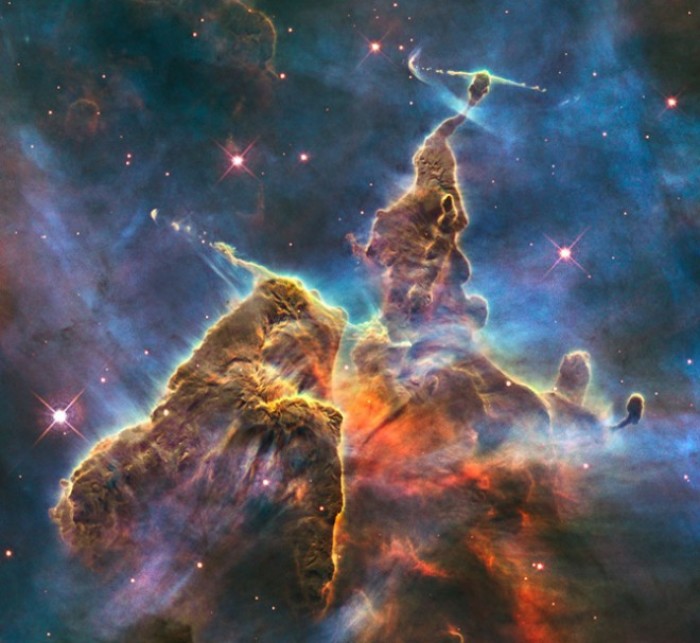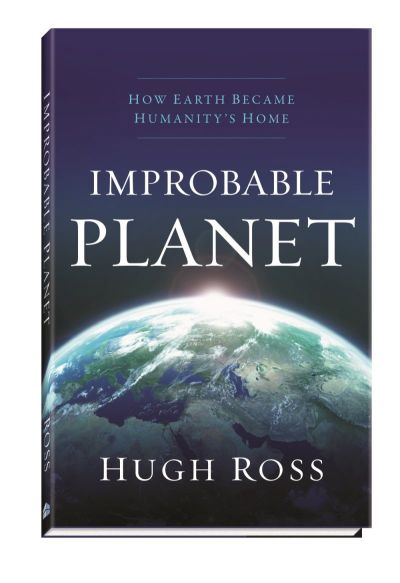Did God Create Any Other Planets for Life? Hugh Ross Looks at the Scientific Evidence

Is there life out there? Dr. Hugh Ross looks at the scientific evidence for another Earth, a planet capable of sustaining sentient life, in his new book, Improbable Planet: How Earth Became Humanity's Home.
More than that, Improbable Planet places the debate over alien life within the context of life's larger question: Why are we here? Ultimately for Ross, the question of the uniqueness of Earth in the universe derives from the biblical story of creation, fall and redemption.

In an email interview with The Christian Post, Ross says he wrote the book to show how the history and composition of the universe fulfills God's purpose of "making possible billions of human beings hearing and responding to God's offer of redemption from their sins and of an eternally secure and loving relationship with Him."
Ross has both the scientific and theological background to write this book. He's an astronomer, with a Ph.D. from the University of Toronto, and a pastor with an M.Div.
Founder and president of Reasons to Believe, Ross' previous works include A Matter of Days, on the creationist controversy, and Who Was Adam? on what science tells us about Adam and Eve.
Here is the lightly edited transcript of his CP interview.
CP: Why did you write this book?

Ross: The book had its birth in a year-long study of the Bible's major creation texts. I noted that all these texts link the doctrine of creation to the doctrine of redemption. I also noted that several biblical texts declare that God initiated His works of redemption before He created anything and that God intends to redeem a countless number of human beings within a very brief window of time.
These biblical tenets imply that all God's works of creation serve a role in making possible the redemption of billions of human beings within just thousands of years.
This biblical study led to a three-year search of the scientific literature to test whether my deductions were correct. Improbable Planet is the outcome of that three-year search. It describes and documents how every component of the universe, Earth, and Earth's life and every event in the history of the universe fulfills an important role in making possible billions of human beings hearing and responding to God's offer of redemption from their sins and of an eternally secure and loving relationship with Him.
CP: "With so many stars in the sky, there must be other sentient life out there," I often hear. What's your view?
Ross: The conclusion that sentient physical life must be abundant in the universe arises from four false assumptions: 1) The water habitable zone is the only determinate for the habitability of a planet. 2) Every star is a candidate for possibly possessing a life habitable planet. 3) The origin of life is a naturalistically easy step. 4) Natural process evolution from a simple single-celled organism into the equivalent of human beings is inevitable given the passage of several billion years.
I devote a chapter to each of the first three assumptions and several chapters to the fourth assumption showing scientific evidence, evidence that has become much stronger during the past two years, that all four assumptions cannot possibly be true. For example, for a planet to be truly habitable it must simultaneously reside in all nine known habitable zones (liquid water, ultraviolet, photosynthetic, ozone, rotation rate, obliquity, tidal, astrosphere, and atmospheric electric field). Of the 3,547 planets discovered so far, only one resides in all nine known habitable zones — Earth.
CP: Why is the search for life outside our planet important for many scientists?
Ross: There are three reasons why it is important. For scientists holding a non-theistic worldview the discovery of life on many planets outside our solar system would be taken as evidence to support their claim that a natural, relatively straightforward pathway, independent of any external Intelligent Design, exists to explain life's origin.
These scientists and other scientists also note that the origin of life occurred on Earth as early as the laws of physics and the gross features of the universe would permit and that the origin of life on Earth was immediate, not gradual. These observations are seen as additional evidences that the origin of life must be natural and straightforward.
What all these scientists overlook, however, is that unless the origin of life on Earth occurred immediately and as early as physically possible there would be no possibility for the future existence of human beings or their functional equivalent in any time scale.
A third reason why the search for extraterrestrial life is important for many scientists is that they are all too aware that the window of time for the existence of advanced life on Earth is rapidly coming to a close. They are convinced that the only hope for humanity is to find another planet in another planetary system that we humans can colonize.
CP: You've written books from the view of Christians speaking to other Christians about science. Most of this one reads like a science geek talking to people who love science. Why this approach?
Ross: All of my books are written to encourage and assist Christians in their ministries of evangelism. I encourage Christians to read my books and then give the books away to non-Christians who they know will be impacted by the books' content and message so that they will consider giving their lives over to their Creator, Lord, and Savior.
Improbable Planet explains how every component and event in the universe, Earth, and Earth's life plays a role in making possible the redemption of billions of humans in just thousands of years.
As non-Christians become convinced that redemption explains why the record of nature looks the way that it does, my prayer is that discovery will motivate them to find out exactly what is the offer of redemption and what specific purpose God has for them in this life and in the life to come. As for readers who are already Christians, my prayer is that discovery would motivate them to worship and praise God like they never have done before.
Finally, I do confess that I am a science geek talking to people who love science, but I believe that if science is presented in the right way everyone will love science. That right way is to communicate the purpose and worship response God wants us to receive and understand from studying the book of nature. After all, the book of nature is God's second book of revelation to humanity, a book that Psalm 19 and Romans 1 commands us all to read and obey.
CP: Why should Christians, in particular, read this book?
Ross: This book will give Christians reasons and motivations to worship and praise God for His creation like no other book they have read. It will also uniquely equip them to use the book to bring non-Christians to faith in Jesus Christ who otherwise would remain resistant to the Gospel.





























